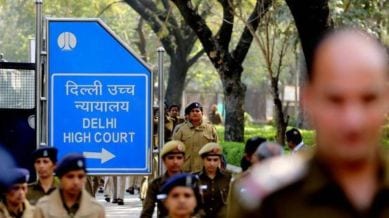Stay updated with the latest - Click here to follow us on Instagram
‘Alimony can’t be granted to spouse who’s financially self-sufficient’: Delhi HC
The court was hearing a plea was filed by a woman, employed as a Group ‘A’ officer of the Indian Railways Traffic Service.

The Delhi High Court on Friday held that grant of alimony “is not automatic” and without a finding of a financial hardship, it cannot be granted where the spouse is “financially self-sufficient”.
The court was hearing a plea filed by a woman, employed as a Group ‘A’ officer of the Indian Railways Traffic Service. As per the order dated October 17, she sought permanent alimony and compensation from her husband, who is an advocate, after their divorce.
monthly limit of free stories.
with an Express account.
Married in 2010, the couple lived together only for a year. The marriage was dissolved by a family court in August 2023 on grounds of cruelty.
The woman also challenged the family’s court finding of cruelty inflicted by her on her husband, based on which it had refused alimony.
Taking into account that the woman “did not appear to be averse to the divorce itself, but was seeking to canvass the need for financial security”, the HC observed, “When a spouse, while ostensibly resisting the dissolution of marriage, simultaneously predicates consent thereto upon payment of a substantial sum, such conduct inevitably indicates that the resistance is not anchored in affection, reconciliation, or the preservation of the marital bond, but in pecuniary considerations.”
The division bench emphasised that Section 25 of the Hindu Marriage Act (HMA) leaves courts with discretion to award permanent alimony and maintenance, taking into account the income, earning capacity, property, and conduct of the parties, as well as other relevant circumstances.
The bench of Justices Anil Kshetarpal and Harish Vaidyanathan Shankar, however, reiterated that the provision “is fundamentally equitable in nature and aims to secure financial justice between spouses, ensuring that a party lacking independent means of subsistence is not left destitute following the dissolution of marriage. However, the grant of such relief is not automatic; it is contingent upon proof of genuine financial necessity and equitable considerations.”
“It is a settled principle that permanent alimony is intended as a measure of social justice, and not as a tool for enrichment or equalising the financial status of two capable individuals. The law requires that the applicant demonstrate a genuine need for financial assistance. In the present case, the appellant’s position as a senior government officer, her steady and substantial income, and the absence of dependents collectively establish that she is fully capable of maintaining herself. No evidence of financial incapacity, duress, or other compelling circumstances has been presented to justify judicial intervention,” the court held, while refusing the request for permanent alimony.
“The material on record does not disclose any evidence of financial hardship, dependency, or extraordinary circumstances that would render her incapable of maintaining herself with dignity. There is also no pleading or proof of any financial liability, medical condition, or familial obligation that could necessitate monetary support from the respondent. Additionally, there is no evidence to suggest a substantial difference between the incomes of the parties,” the court reasoned.